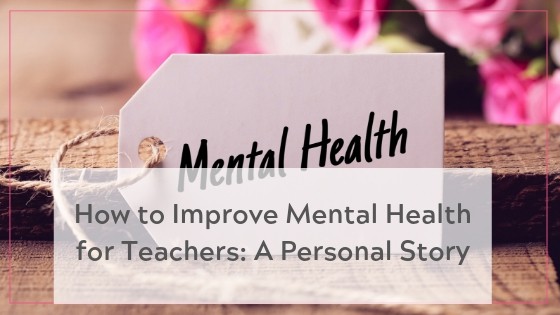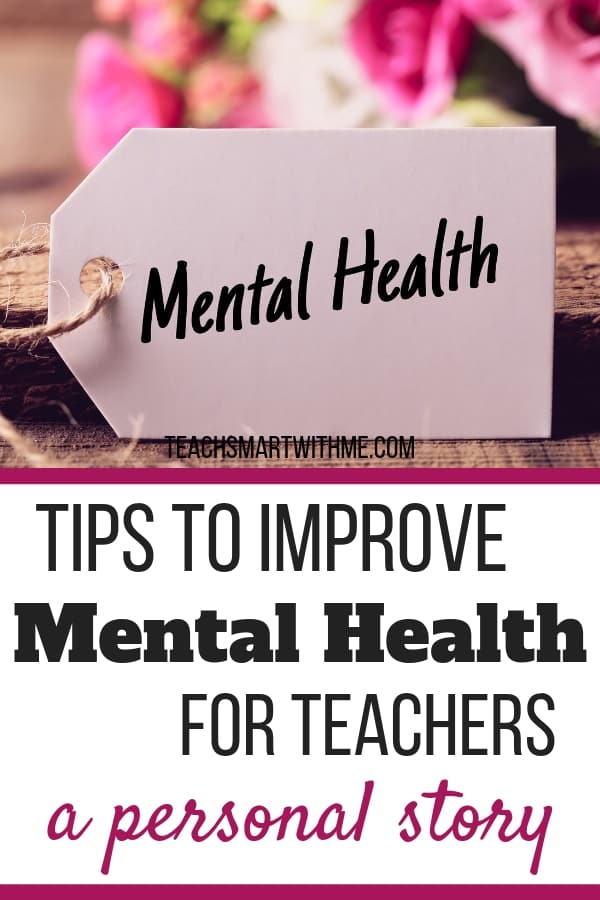Read the story of a teacher’s personal mental health journey and find tips and suggestions to help improve teacher mental health and wellbeing for over-burdened professionals.

Updated: 18th May 2020
The pressure was rising! I could feel the heat in my cheeks and the knot in my stomach tightening.
It was Sunday afternoon; before my huge work-week began.
As I started to turn my thoughts back to school and plan my teaching week, the negativity started.
It wasn’t just the usual Sunday night work blues. I felt like a flat piece of worn-out sandpaper – torn and lifeless.
I’d been teaching for over 8 years, but it was in the last few, it had gotten so hard to be a teacher — all the burdens and unrealistic expectations were taking their toll on my health, particularly on my mental wellbeing.
I started the profession many years before, full of excitement and the possibility for the positive change I could make with all the young lives in my care — the ones I could help and make a difference with.
But teaching had become the most MOST difficult undertaking in my life.
I thought the stress and huge workload of my job in local government were tough… but, Oh. My. Goodness! Teaching beats the cake!!.
All the teaching demands
- Talking all day – to students, parents and administration
- The never-ending to-do list
- The lack of appreciation and understanding all that you do
- The overwhelming burden of responsibility
- The high stakes of data collection and lifting underperforming students to national benchmark standards
- The all too many meetings
- The unrealistic deadlines
- Dealing with the rising number of students with behavioural issues as well as all their social and emotional needs
- The physical, mental and emotional drains on you every day!
I could go on. But, there are honestly too many to list. You know the picture of the iceberg? – it’s like that – all the unseen work!
I’m sure none of this is new to you and I’m certain you’d be able to think of many more things than I have.
But what I’ve realized over time is that all the stress and huge demands take their toll on you. You might not see it straight away, but the longer you neglect your personal needs, the avalanche will rumble down the mountain and consume you until there’s nothing left.
This is what happened to me…
No-one teaches teachers how important it is to take care of themselves.
Sign up and get the FREE Stress-Busting tips here:
Mental health risks for teachers
Little did I know that my personal neglect would impact me as a teacher. For many years I just threw myself into the job every day and when I came home I was so exhausted there was no energy for anything — even me!
Over time I developed into this grumpy and short-tempered grouch. My fuse was short and I had little patience for anything. What made matters worse was that I wasn’t sleeping well because I couldn’t stop thinking about school and I just didn’t feel happy anymore. These are all signs of mental health problems.
But my symptoms aren’t new for teachers.
Studies tell us that many educators experience high rates of mental health illnesses. Serious issues such as anxiety and depression.
I was just naive to all these risks.
When you think about, we’re not made aware that our job can impact our mental health, which is ultimately so critical to student outcomes. You would know yourself, that when you’re feeling low, tired and in a negative frame of mind your teaching role is certainly compromised.
Disclaimer: I am not a mental health professional and all suggestions made are my personal opinion and do not form a diagnosis or medical treatment.
My journey to improve my mental health
It wasn’t until I got to my lowest point, that I knew I needed to make some changes. Changes that would be lasting and not just a quick fix.
So how can you pull yourself out of a pit of despair?
Related Article: 15 Stress Management Techniques to Calm the Mind and Body
I had to get professional help
I finally succumbed and took myself off to my new doctor. He was great and listened intently to me as I blurted it all out through the tears.
All the overwhelm …the stress… the under-appreciation and the huge demands I was experiencing as an overworked teacher.
He got it.
He told me of other teachers he knew that were experiencing the similar overwhelm of teaching and its effects on their health like me. I wasn’t the only one!
The docs first idea was for me to see a local counsellor.
At the time, I thought this suggestion was way off base – Me? Seek counselling. I’d never considered the need for professional therapy.
Was I really having mental health problems? I knew something had to change as I couldn’t keep going the way I was.
And me, being the natural worry-wort – my first thoughts were agonizing over what others would think of me and all the practicalities of my choices – my mind raced to try and process it all.
All this aside, I did follow his directions and made a therapy appointment.
My visit to a counsellor
To my surprise, the lady counsellor was very perceptive. As she listened to my shaky voice, as I tried to articulate my predicament, she cleverly helped me wade through my brain fog and identify important goals that I’d needed to make progress.
She also helped me to realize I must make myself a priority and add self-care to my daily routine. To be able to find ME again. I share these breakthroughs in the post called Practising Self-Care to Prevent Teacher Burnout.
In our sessions together, we discussed the process I’d need to follow to help improve my mental state and progress forwards.
I’m super keen to share them with you here:
Related article: How to Start a Self-care Routine for Busy Teachers
Steps to improve my mental health
At the time, her suggestions seemed difficult and even impossible, but I knew that if I didn’t do something, I would probably have a breakdown.
Based on my own personal goals these are the steps that I’d need to accomplish to help improve my mental health:
- Step 1 – Find time for self-care
- Step 2 – Implement self-care practices into a regular routine
- Step 3 – Identify stressors in my life
- Step 4 – Relieve the stress on my body
- Step 5 – Reduce my working hours/days
- Step 6 – change my mindset
I first started on personal self-care, which was totally lacking in my life.
Self-care is critical for mental health
On my journey to improving my mental health, I realised self-care must become a priority. It firstly began with a mental shift and understanding that teaching should take a back seat in my life if I was going to heal.
But I knew little about what self-care was and what I needed to do to implement it in my life.
This began my personal self-discovery.
Along the way, I’ve become a passionate advocate of teacher self-care and the importance for teachers to prioritize themselves and their wellbeing. As you know, many of us seem to have the propensity to put our needs last.
Mental health and overall wellbeing is so closely linked to self-care.
I’ve now written many articles about teacher self-care and how important it is to look after yourself. I’m sure you’ll be interested to read from these:
- Teacher Self-Care: A Time for a Self-Care Inventory
- Practising Self Care to Prevent Teacher Burnout
- 8 Simple Habits of Self Care for Teachers
- How to Make a Self-Care Kit for Tired Teachers
- Teacher Voice Care: How to Protect Your Most Important Resource
Relieve stress to support mental health
It’s also become clear how important it is for teachers to get a handle on their stress as part of self-care if they’re going to support their mental health. I know it was something I had to learn as part of my journey to good health.
Here are a variety of articles I’ve written discussing this important topic:
- 15 Stress Management Techniques to Calm the Mind and Body
- A Straight-Forward Tips to Relieve Teacher Stress (You Won’t Believe)
- Why Is It So Important For Teachers to De-Stress?
- 3 Powerful Stress Management Tips for Teachers
As part of daily self-care, I now incorporate stress-relieving techniques, in conjunction with the reduction of my working hours to support my recovery and get well.
It’s been quite a long journey for me, but I’m changing the tide and with the continued professional help, I making huge gains to improve my overall health and mental wellbeing.
It hasn’t been easy, but I have learned a great deal about myself and the power of the mind and the necessity to set boundaries in my life to gain a more work-life balance – A must for all teachers.
I’m now discovering the amazing benefits of developing a growth mindset and being thankful for all the good things as a source of positivity in my life. I do this with gratitude journaling. Read the article to find the details of how you can improve your outlook.
A positive growth mindset helps a teacher’s mental state
I’ve learnt that by pondering on the good things, we have the power to change our mindset and improve our mental state. In teaching, this is so important, otherwise, you’ll find that negativity can creep in.
These days here are some of the things I focus on and continue to be grateful for each day:
- the happy smiling faces of your students when you arrive in the morning
- the moments that students have lightbulb moments in their learning
- the beautiful handwritten notes and cards that show appreciation for you as their teacher
- the times when you have a breakthrough with a difficult child’s behaviour
It makes me smile when I’m reminded of these things. Why don’t you give gratitude a try!
Other tips to help improve teacher mental health
- Reach out and talk about your situation. Find a counsellor, like I did that you gel with and talk about your problems
- Take part in activities outside of school
- Put your own life first
- Don’t stay at school for hours and hours. Make a day per week that you leave school early and do something for yourself
- Include at least 2 nights per week that you allow yourself to switch off from school work – Read this article to help you stop thinking about school
- Have a mental health day or self-care day when you need it. Listen to your body
- Practice self-care. Read my post about my self-care journey
- Write down 3 things per day that you are grateful for. The idea of a Gratitude Journalling is a well-known strategy to help with teacher burnout and improve mental health.
Where to from here with teacher mental health?
Health care is always a journey for anyone. I’m still working on my mental health every day and I’m always open to other solutions.
I love listening to positive podcasts like the one called The Teacher Wellbeing Podcast. It gives helpful and relevant information for any educator.
In finishing, if you ever find yourself feeling down, I recommend you do something about it before your mental health is at greater risk.
Don’t just neglect yourself and hope your negative thoughts will go away. I’m still learning about this topic too and the power of the mind!
I don’t know if I will ever cure the Sunday night knot in my stomach, but I’m trying.
I hope my story has helped you in some way.
Remind yourself that you are a person first and a teacher second, (Self Care for Teachers).
For more information about mental health and self-care, I have included some of my resources for you.
Websites:
Books:
- Living Beyond Burnout by Lisa Murray
- Self Care for Teachers by Dr Matthew Allen
Pin it to your favourite board!

Remember you are worth it!
Michelle xx



Leave a Reply